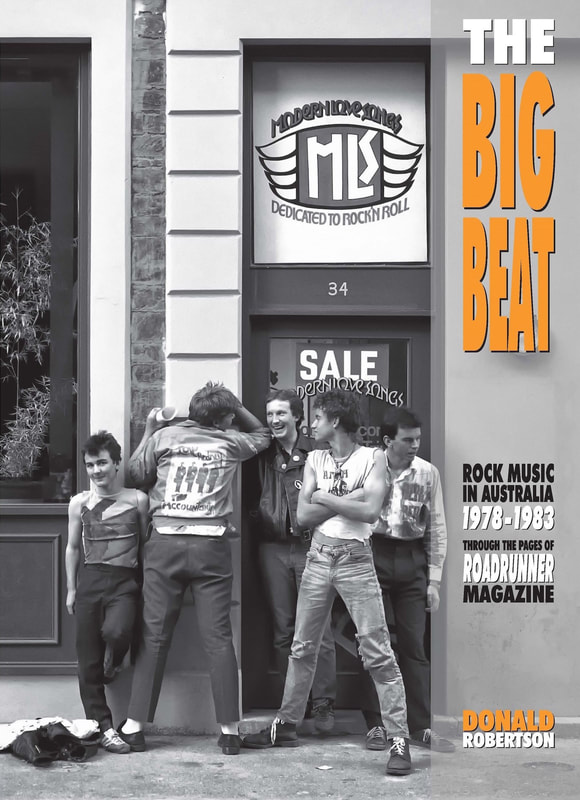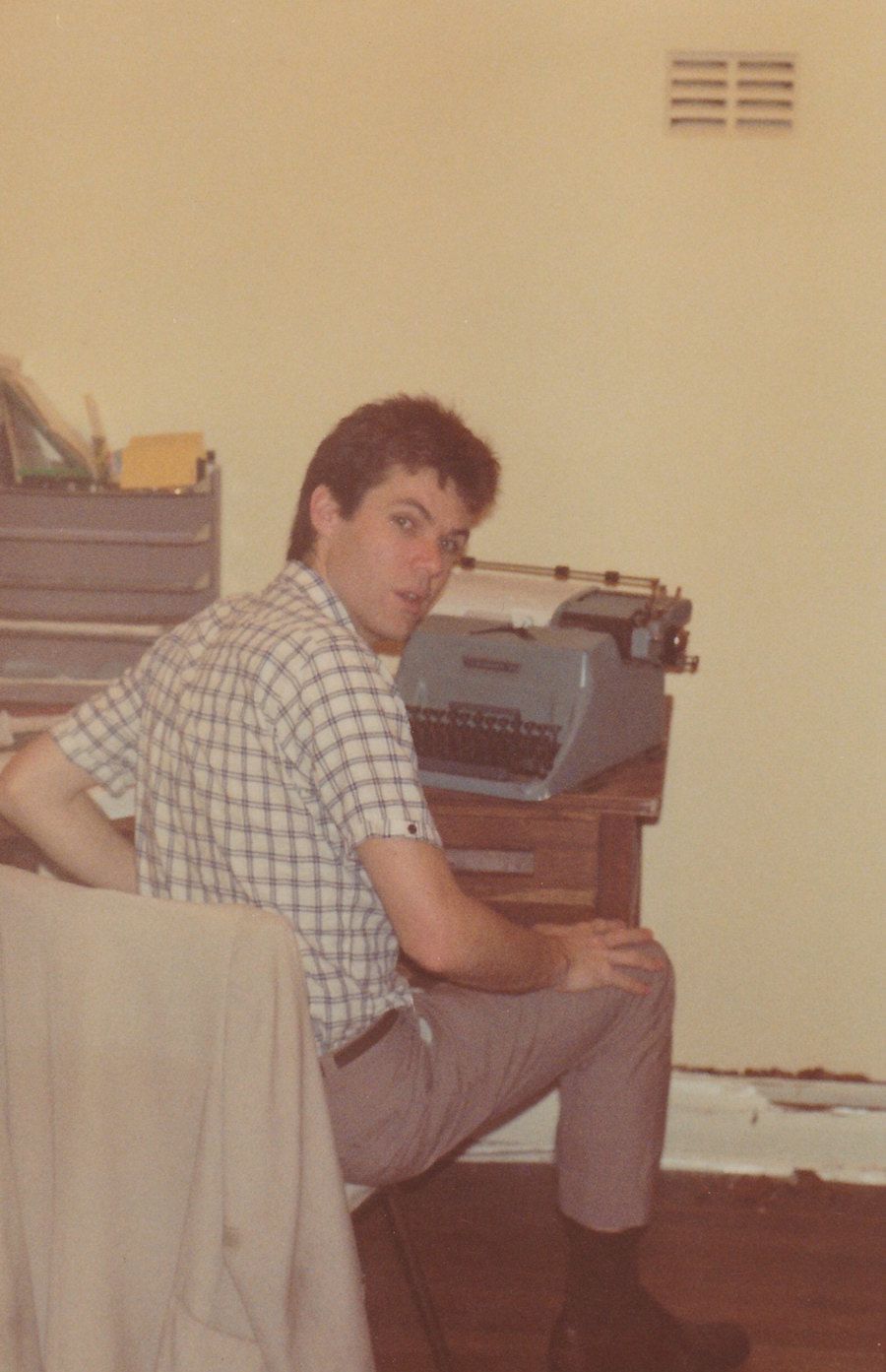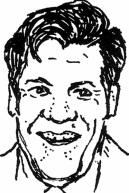| How embarrassment! Now I know that’s probably not the best way to open this little notice on the publication of an anthology of not the best-of but the entirity-of Roadrunner magazine, because I am stoked to see it and it’s a very welcome addition to the bibliography, but that’s certainly how my (very adolescent) contributions to the magazine and thus this book The Big Beat make me feel. Because when I started writing I couldn’t write, I’ve never been afraid of admitting that, and that’s what you can read of mine here, some pretty poor prose… But I know, I know, it’s not all about me, at all, and thank Christ for that! Roadrunner was the Chrysler of the Big 3 R rock magazines in Australia at the turn into the 1980s, trailing the GM and Ford of RAM and Rolling Stone, and like the Hemi-powered Plymouths and Dodges, it was wild and untamed, and it’s a blessing that there’s now a permanent record of it, all 500 pages of it and bound in a beautiful hard cover as you can see here: |
| It was cruel but fair but barely fair the way the late Anthony O’Grady used to describe Roadrunner as the outlet for the stories RAM rejected. There was more to it than that, so much more… I first met Stuart Coupe and Donald Robertson, the real godfather of Roadrunner and the man who’s shepherded this magnificent volume to publication, back in 1978. The world was so much bigger then, and smaller too. Donald and Stuart put out one issue of their punk fanzine Street Fever in Adelaide, and had folded it with the idea of launching a magazine: the distinction seemed stark back then, but from here I can hardly see the difference. Bruce Milne and I in Melbourne were in the process of folding our fanzine Pulp, and so we decided to throw our lot in with this mob we’d heard about over in Adelaide. I’ve written before on this subject here and here so I want to try and avoid repeating myself. Bruce and I went over to Adelaide, the magazine got going, Bruce then even moved over to Adelaide for a while, and I served as ‘Melbourne Editor’. The magazine survived the defection of Stuart Coupe over to RAM, but Bruce didn’t and he soon returned to Melbourne. But it was always Donald’s baby really and I can’t find higher praise for the commitment he put into Roadrunner over its every single issue up until its last, in 1983. But for Donald to have somehow found that same amount of commitment and energy to get The Big Beat out now, at a now very much more advanced age, well, it’s humbling and inspirational to me. Initially, Donald made a mistake similar to one I’d made recently too, which was to sign The Big Beat on with Perth publisher Starman Books. Best I not say too much about Starman for fear of defaming them; suffice it to say, Donald and I are not the only two writers to have recently had to use the termination clauses in our contracts to walk on Starman. So Donald took it all on to self-publish and we can only be thankful, again, that he did... |
| As the new kid on the block in the late 70s/early 80s, Roadrunner had both advantages and disadvantages. Its scope was wider than the more established RAM and Stone with their respective commercial constraints, but even within that, its inexperience – my inexperience! – showed. But Australia was in the middle of a music explosion, and there was a vast audience that couldn’t get enough of the inky newsprint on the subject, and this was a wave that Roadrunner rode the same as RAM and Rolling Stone did. Only just all a bit more loosey-goosily. For me, my first pieces for the early issues of the rag were mainly live reviews, and while I can understand why I might have been willing to go and see Graham Parker, or Stiletto, I cannot for the life of me remember how Donald convinced me to go along and see Status Quo. But I did and I filed reports and they probably weren’t that badly written. Well, looking back over them again here now, yes they were, they were pretty terrible. But I will say one thing in my defence, and I don’t think many would argue with me on this: I didn’t hold back! |
| If I didn’t like something I said so, and even in the Roadrunner firmament that attitude wasn’t universal. Whether my approach was due to arrogance, ignorance, special insight or just insensitivity I’m not sure, probably a bit of all four. But there was an aspect of it that I think adds further to my advertisement for myself here – I might not have been able to write (yet), but I could hear, I had ears, and maybe that was the pay-off. I am reminded now I wrote a lengthy review of the Stones’ Some Girls album for RR, and it’s a mess, structurally, but if you can wade through the clutter you can discern that critically, it was close to on the money. In making the transition to a soon to be nationally-distributed actual magazine, Roadrunner had to broaden its base out from the previously punky precepts of Street Fever. Even I understood that. And so as Roadrunner made staples of emerging new pub bands that I wasn't interested in whether Midnight Oil, the Angels or INXS, I didn't mind, even as it ironed some of the kinks out in the mag to indeed put it on an aspirational par with RAM, because with most of the writers all fawning over this stuff, it left the good shit mostly to me. Put it this way: When Chris Bailey put together a new post-Ed Kuepper incarnation of the Saints and came back home from the UK to play a tour, the response was rapturous in a way the original Saints never got. I of course was outraged, and said so, in a decimation of the band published in another magazine that forty years later I regret as probably ill-judged and certainly ill-mannered, but the main point here is that at least Roadrunner, Donald, allowed me to instead shine a light on the new band that Ed Kuepper had that was relatively languishing in inattention, the Laughing Clowns. And that, for me, was the great glory of Roadrunner: When most every other rock critic in the country, including at Roadrunner, was fawning all over Cold Chisel, the Angels and Midnight Oil - and the neo-Saints! - I was sticking my neck out and giving some of the first-ever media coverage to long-shots like the Laughing Clowns, the GoBetweens and Nick Cave's Boys Next Door. And note that this wasn't without its perils; many thought the GoBetweens, say, were just a joke, and I did what I did in the face of ridicule and contempt. You can read some of this stuff in The Big Beat, or here and here. But again to Donald's great credit, he gave me rope, regardless of what he thought of what I thought. He gave me rope to write decimations of other bands too and some of those caused enmities that still persist forty years later too. Me, I reckon we all make mistakes and get wronged equally, and you just have to soak it up and keep moving. I wrote a third of an RR cover story (shared with XTC and the Angels, in July ’79) on new Australian ‘elektronik musik’ and it was such a good centre-page spread that two years later in Sydney, Rolling Stone got me to do it again, or rather update the exact same idea. It was a ‘good story’ not in the sense it was well-written as that it was a thing, or a coming thing, and though by the time I did the Stone version my writing had indeed vastly improved, it was if the bailiwick still seemed to belong to me alone almost. Everybody else was still fawning over Chisel, the Saints and INXS - how hard was that to do? When even if forty years later I can appreciate the pop success of, say, Mi-Sex, I've got no doubt - and I think history bears me out on this - how seminal, say, Ollie Olsen or the Primitive Calculators were. And Roadrunner ran my coverage of Whirlywirld, and the Calculators, and Peter Lillie and other less obvious Melbourne music. So even if Roadrunner pretty quickly ended up competing with RAM in terms of pretty much all the same cover stories - which is what it had to do just to sell copies - the pages inside, as The Big Beat shows, were much more diverse, much more daring. And I think that’s what made RR more than just the bronze-medallist. It had less to lose! I remember Ross Stapleton wrote a number of major, deep-impact investigative features for the mag in the late 70s. Stapleton was a guy on the make (turned out all he really wanted was a job with a record company) who'd given me and Bruce an amazing story for Pulp on the hilarious London meeting of Molly Meldrum and the Sex Pistols. For Roadrunner, he wrote, among other things, an in-depth examination of the machinations of Australia's live/touring/pub circuit (based on round-table interviews with the top booking agents), and he wrote an in-depth examination of Michael Gudinski's business interests, and these were stories that the Big 2 (RAM and Stone) would indeed doubtless have rejected, would never have run, for fear of repercussions. Stapleton himself soon enough disappeared (indeed got a job with Virgin in the UK as we were given to understand), but it's enough that we are left with those important, revealing references and now even more accessibly for the record in The Big Beat. Donald Roberston was prepared to take the game on, and in the same way that these days I never read the erstwhile Farifax press without also reading the News equivalent, so I can counterbalance the biases on both sides, I needed to consult both RR and RAM back in the day before I could really start to form an opinion on anything; Stone I took with a grain of salt at least up until it sort of reinvented itself when it went monthly in 1980. But Roadrunner never paid for contributions, and as Donald has reprinted in his notes here, I had to write a letter (remember those?) at one point begging for money to buy film for my camera (I had a very short-lived tenure as a photographer on my own stories). So when I moved from Melbourne to Sydney in 1980 and found almost overnight that I could write for both RAM and Rolling Stone and get paid for it, that’s what I did. But Donald steered RR on and it offered a crucial adjunct to RAM and Stone, and it outgutsed and outlived start-up upstarts like Backstage (from Brisbane) and Vox (from Melbourne) and it happily afforded an outlet for great if shooting star writers like Peter Nelson, Adrian Ryan, Craig N. Pearce and others. The mag's move from Adelaide to Sydney in 1982 was as necessary as it was risky (I was overseas at the time), and eventually the risk won out and the magazine folded after one issue in a new A4 glossy format in 1983. It’s all here in these pages, unvarnished, unrevised, except for the additional running commentary from Donald. I don’t need to read yet again the story of Australian music’s renaissance in the 80s, it’s been told a million times. The Big Beat does that, to be sure, but being what it is, it tells another story as well, and that’s the story of the way we processed that music in its real-time. As embarrassing as it sometimes is for me, it’s very much my story too, and so I have to be happy enough to embrace it. The Big Beat reminds me that in so many ways I haven’t changed, and neither, surprisingly, has the media landscape, really, because all it still takes is a few kids or anybody with a keyboard and a bit of an idea and you can get your voice out there, perchance to maybe even change things. I think Roadrunner was a crucial component in a crucial phase of Australia’s cultural history. If I was still teaching I’d tell young journalism students to read it and try and do better. You can see some of the glowing responses the book has garnered here at 'Roadrunner Twice', and buy it online here. |



